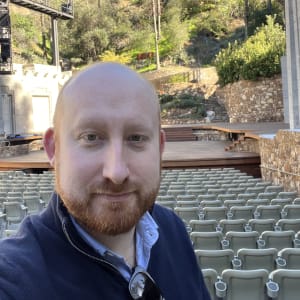Made Next
Digital Leadership in the Arts: Building a Team
October 20, 2021
In the last edition of Made Next, I outlined six behaviours that are exhibited by digital leaders in arts and cultural organisations:
- Digital leaders are trusted partners in business decisions.
- Digital leaders are comfortable navigating the changing external environment, technological capabilities, and internal systems.
- Digital leaders consider the potential return on investment at all stages of the strategic planning process.
- Digital leaders make informed investment decisions based on relative benefits of building, buying, or adapting technology.
- Digital leaders have established methods for testing and refining new ways of working.
- Digital leaders are prepared to handle strategic trade-offs in order to make technology work for them.
These are all important, foundational behaviours that are required to make an effective impact on the digital output of an organisation. However, they should also be seen as a starting point in the journey to build an effective digital team.
One of the questions I’m often asked is: how much digital work can be efficiently outsourced to teams outside of an organisation, and as a result, what skills are needed ‘in-house’ to deliver on an organisation’s digital strategy?
Often, the dividing line is drawn between ‘high’ and ‘low’ levels of specialised expertise, with anything requiring high levels of specialist knowledge or skill being a prime candidate for outsourcing. However, this often leads to a deficit of in-house specialisation, with organisations lacking the most appropriate mix of digital skills to deliver on their strategy. Sometimes this is most evident when considering skills such as product management or digital transformation — both are important areas of expertise for an arts or cultural organisation to draw upon, but hiring outside resources in these areas can run the risk of a ‘helicopter’ approach: consultants come in, make recommendations, and then leave without embedding long-term change in the organisation.
Instead, I prefer to think of a distinction between ‘tangible’ and ‘intangible’ processes, and between ‘fast’ and ‘slow’ moving fields of expertise.
There’s a clear dividing line between tangible and intangible processes. Tangible processes result in an output that might be broadly similar regardless of whether you’re an organisation that delivers cultural experiences or if you’re an organisation that sells shoes. Tangible processes can usually be fairly adequately described in terms of their output: a software application that needs to do X, or a report that explains Y, or a PPC campaign based on Z parameters. This doesn’t mean that these processes are uncreative, just that it’s usually fairly clear what the output of the process will be before you start. Tangible processes include technical activities like coding, quality assurance, data analysis, and management of platforms such as PPC and social media.
Intangible processes rely on an implied understanding of an organisation’s mission, purpose, and brand to produce results. They may often end up in a very different place from where they started, because the very act of going through the process may change the initial brief. Intangible processes include more creative skills such as copywriting, design, and strategy.
Another way of looking at these skills is to think about fields of expertise that move fast or slowly. For example, fields such as software development or social media management can move very quickly, with new frameworks and platforms emerging on a daily basis. On the other hand, processes such as project management and copywriting have changed very little in the past few decades, even if some of the platforms or tools that are used to facilitate these tasks change over time.
Fast-moving fields of expertise require constant immersion to keep up-to-date with new ideas and approaches, and can be hard to replicate in small teams where one individual may be required to contribute across multiple areas of work. These fields can also be hard to recruit into, because they require specialist knowledge from the person doing the recruiting as well as the person being recruited.
On the other hand, more slow-moving fields allow for deep expertise to be built up over time and for individuals to really understand how their expertise can contribute to the success of the team as a whole. Crucially they provide space for both domain expertise, such as in copywriting or project management, but also sector expertise, in the business of arts and cultural organisations.
| Process | |||
| Tangible | Intangible | ||
| Speed | Fast | Software Development Data Analysis PPC/Social Media Management |
Design Strategy |
| Slow | Project Management Quality Assurance |
Copywriting | |
Once you’ve categorised the skills that you need in your team, how do you decide how these skills should be made available in your team?
Tangible and Fast-moving
In many or most cases, tangible processes where the field of expertise is moving quickly are prime candidates for outsourcing to a third-party. There are significant costs involved in maintaining these skills in-house, and unless you have a large enough digital team that you can support this activity internally, the risks of losing the one or two key people who provide this expertise is too great.
Intangible and Slow-moving
Any area of your digital output that is both intangible and slow-moving is probably one you want to keep in-house. These areas often allow for deep expertise of your sector, as well as expertise of the activity being undertaken. This is the area populated by the people who are most passionate about what you do and how you do it. In the case of processes such as copywriting or content creation, having these people in-house means that they can more effectively discover and develop the stories that will power your organisation's mission and long-term strategic goals.
Tangible and Slow-moving
Some processes produce tangible outputs and also exist in slow-moving fields of expertise. In these cases, a deep knowledge of your sector is not critical, but it can be beneficial, depending on the project. In most cases, these are the processes where you want to deliver the activity as efficiently and effectively as possible — in other words, you want to optimise the delivery of these activities. In some cases, this might mean engaging with a third-party to supplement your in-house team. This might be a great opportunity for a freelancer or independent consultant who can get to know your organisation over the course of multiple engagements. Or you may find that your organisation is particularly well set up to support these processes (such as hiring a project management resource on your digital or business development team), in which case you could keep them in-house.
Intangible and Fast-moving
Processes that are both intangible and fast-moving, like digital transformation, are areas that have often been outsourced because they are perceived to be high expertise. The long-term result of this approach is that many organisations feel a deficit in these areas, particularly related to skills in digital design or strategy. There can be a real benefit for organisations in developing these skills internally, because deep knowledge of the organisation’s mission can significantly enhance the quality of the intangible outputs being produced. The challenge for digital leaders is in working out how to navigate the tension between needing a familiarity with the work of the organisation, and maintaining skills in a fast-moving space. The best way can be to develop highly collaborative partnerships with third-parties who can provide provocation, training, and an external perspective on your challenges, while ensuring you have some capacity in-house to provide continuity and coaching across the organisation.
| Process | |||
| Tangible | Intangible | ||
| Speed | Fast | Outsource | Collaborate |
| Slow | Optimise | In-house | |
As a final note, it’s also important to update your skills map as technologies develop, along with your digital roadmap. Over time, some areas of expertise will become more established, and as they do they may move from being considered ‘fast moving’ to ‘slow moving’. One example of this is video production, which is becoming an increasingly core part of many organisation’s digital output in a way that it wasn’t five years ago. Some areas of expertise may need adding to the list, including specialisms in virtual reality or connected devices, which may enter the framework as a fast-moving field of expertise.
This article is taken from Made Next, a new newsletter from Made Media looking at emerging and future trends at the intersection of digital technology and the world of arts and culture.
Subscribe to Made Next and get future editions sent directly to your inbox.
Subscribe to the
newsletter
Sign up now to our utterly private, spam-free and occasionally insightful newsletter.




